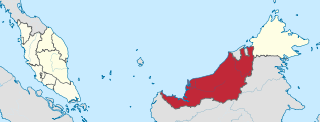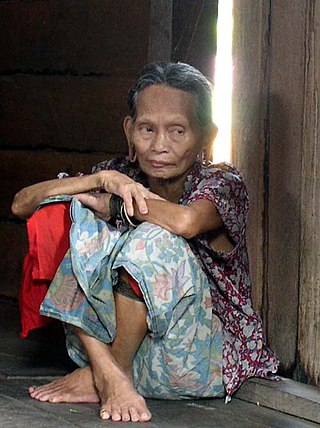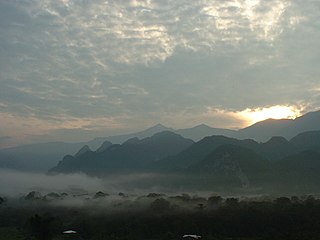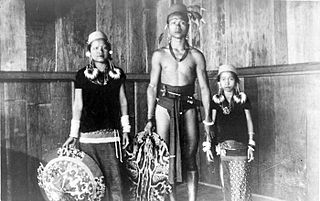Related Research Articles

Sarawak is a state of Malaysia. The largest among the 13 states, with an area almost equal to that of Peninsular Malaysia, Sarawak is located in East Malaysia in northwest Borneo, and is bordered by the Malaysian state of Sabah to the northeast, Kalimantan to the south, and Brunei in the north. The state capital, Kuching, is the largest city in Sarawak, the economic centre of the state, and the seat of the Sarawak state government. Other cities and towns in Sarawak include Miri, Sibu, and Bintulu. As of the 2020 Malaysia census, the population of Sarawak was 2.453 million. Sarawak has an equatorial climate with tropical rainforests and abundant animal and plant species. It has several prominent cave systems at Gunung Mulu National Park. Rajang River is the longest river in Malaysia; Bakun Dam, one of the largest dams in Southeast Asia, is located on one of its tributaries, the Balui River. Mount Murud is the highest point in the state. Sarawak is the only state of Malaysia with a Christian majority.

Miri is a coastal city in north-eastern Sarawak, Malaysia, located near the border of Brunei, on the island of Borneo. The city covers an area of 997.43 square kilometres (385.11 sq mi), located 798 kilometres (496 mi) northeast of Kuching and 329 kilometres (204 mi) southwest of Kota Kinabalu. Miri is the second largest city in Sarawak, with a population of 356,900 as of 2020. The city is also the capital of Miri District, Miri Division.

The Penan are a nomadic indigenous people living in Sarawak and Brunei, although there is only one small community in Brunei; among those in Brunei half have been converted to Islam, even if only superficially. Penan are one of the last such peoples remaining as hunters and gatherers. The Penan are noted for their practice of 'molong' which means never taking more than necessary. Most Penan were nomadic hunter-gatherers until the post-World War II missionaries settled many of the Penan, mainly in the Ulu-Baram district but also in the Limbang district. They eat plants, which are also used as medicines, and animals and use the hides, skin, fur, and other parts for clothing and shelter.

The Gunung Mulu National Park, also known simply as the Mulu National Park is a national park in Miri Division, Sarawak, Malaysia. It is a UNESCO World Heritage Site that encompasses caves and karst formations in a mountainous equatorial rainforest setting. The park is famous for its caves and the expeditions that have been mounted to explore them and their surrounding rainforest, most notably the Royal Geographical Society Expedition of 1977–1978, which saw over 100 scientists in the field for 15 months. This initiated a series of over 20 expeditions now named the Mulu Caves Project.

The Rajang River is a river in Sarawak, northwestern Borneo, Malaysia. The river originates in the Iran Mountains, flows through Kapit, and then towards the South China Sea. At approximately 565 km long (351 mi), the river is the seventh-longest in Borneo and the longest in Malaysia.

Miri Division is one of the twelve administrative divisions of Sarawak, Malaysia.

Bruno Manser was a Swiss environmentalist and human rights activist. From 1984 to 1990, he stayed with the Penan tribe in Malaysia, organising Indigenous rainforest blockades in Sarawak against timber companies. After he emerged from the forests in 1990, he engaged in public activism for rainforest preservation and the human rights of indigenous peoples, especially the Penan, which brought him into conflict with the Malaysian government. He also founded the Swiss non-governmental organization (NGO) Bruno Manser Fonds in 1991. Manser disappeared during his last journey to Sarawak in May 2000 and is presumed dead.

Marudi is a town in the Malaysian state of Sarawak, and is a part of the division of Miri. It is the seat of Marudi District, and is located on the banks of Baram River, about 100 kilometres (62 mi) upstream from the river mouth. Marudi was the administrative centre of the northern region of Sarawak before Miri was established in 1910. Marudi is considered as the cultural heart of the Orang Ulu, the highland tribes of Sarawak. It is also a transit gateway to Kelabit Highlands and Gunung Mulu National Park, a UNESCO World Heritage Site.

The Kenyah people are an indigenous, Austronesian-speaking people of Borneo, living in interior North and East Kalimantan, Indonesia and Sarawak, Malaysia.

Dato Jacob Dungau Sagan was the former Member of Parliament of Baram, Sarawak from 1995 to 2013 and was the first Kenyah person to be appointed as a deputy cabinet minister in Malaysia.

Sebauh is a district of Bintulu Division, Sarawak, Malaysia. It shares a boundary with Miri, Baram, Kapit Division, Belaga and Tatau. It has a total area of roughly 5,262.90 square kilometres. Sebauh town is a main administrative and economy centre of Sebauh district.
Long Laput is a settlement in the rural interior of the Marudi district of Sarawak, Malaysia. It lies approximately 514.3 kilometres (320 mi) east-north-east of the state capital Kuching.
Sarawak's population is very diverse, comprising many races and ethnic groups. Sarawak has more than 40 sub-ethnic groups, each with its own distinct language, culture and lifestyle. This makes Sarawak demography very distinct and unique compared to its Peninsular counterpart. However, it largely mirrors to other territories in Borneo – Sabah, Brunei and Kalimantan.
The Baram Dam, also known as Baram 1 Dam and Baram Hydro-electric Dam Project is a proposed gravity dam on the Baram River in Sarawak, Malaysia. The site of the dam is 250 kilometres inland from Miri, the second largest city in Sarawak. The dam is part of the Sarawak Corridor of Renewable Energy and, if completed, would support a 1,200 MW power station. In November 2015, the Sarawak Chief Minister Tan Sri Adenan Satem announced that the Sarawak government had decided to shelf the Baram Dam because the people in Baram did not welcome the plan.
Usun Apau Plieran is a remote abandoned Kenyah Jamuk, Badeng and Lepu Aga' village settled in 1860, Belaga district. To be exact, Usun Apau Plieran is located at the upstream of Sungai Plieran and Sungai Tiyut. The highest peak that close to this area are Bukit Busing 1300m and Mudung Batu Bora about 1450m. There are a few old longhouse sites in this area such as Long Metalon, Long Ampan Aing, Long Bora, Long Taa, Ka Laeh, Lidung Jelo and Lolau Mabo.
Culture of Sarawak exhibits notable diversity in ethnicity, cuisine, and language. The Sarawakian culture has been influenced by Bruneian Malays of the coastal areas. Substantial cultural influences also came from the Chinese and British cultures.
Long Lama is a town in Marudi District, Sarawak state in Malaysia. The town is located at 143 km from Miri with a population of 1,500.
Dato Anyi Ngau is a Malaysian politician who has served as the Member of Parliament (MP) for Baram since May 2013. He is a member of the Progressive Democratic Party (PDP), a component party of the Gabungan Parti Sarawak (GPS) and formerly Barisan Nasional (BN) coalitions. He has also served as the Secretary General of PDP since June 2023.
Indigenous rainforest blockades in Sarawak began during the late 1980s and 1990s. In response to deforestation and land conversion of Sarawak's forest landscapes, Indigenous people of several groups along with international activists organised blockades to resist logging activities and dam construction. Penan, Kayan and Kelabit people are among the groups who participated. Some blockades were dismantled by police and some participants were arrested. Indigenous people have continued to hold blockades into the 21st century.

Fort Hose is a historical fort situated in Marudi, Sarawak, Malaysia. It was built in 1898 by Charles Brooke, the second Rajah of Sarawak, to safeguard government activities in the area, and now serves as a museum.
References
- 1 2 3 Lukas, Straumann (2014). "Chapter 5 – Blowpipes against bulldozers". Money Logging On the Trail of the Asian Timber Mafia (First ed.). Basel, Switzerland: Bergli Books. pp. 111–116. ISBN 978-3-905252-72-9 . Retrieved 2 November 2018.
- ↑ "Harrison Ngau Laing Asia 1990 Goldman Prize Recipient". Goldman Environmental Prize . Retrieved 14 September 2015.
- ↑ "Asia 1990. Harrison Ngau Laing. Malaysia. Forests". Goldman Environmental Prize. Archived from the original on 15 June 2011. Retrieved 11 December 2010.
- 1 2 Stephen, Then (27 February 2008). "Bad roads used as rallying point against the Barisan". The Star. Malaysia. Archived from the original on 2 November 2018. Retrieved 2 November 2018.
- ↑ "Personality more important than party to Baram voters". Free Malaysia Today. 14 February 2018. Retrieved 2 November 2018.